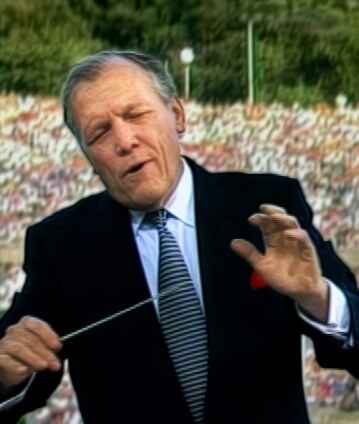Georges Prêtre conducts a “French Night” at the Waldbühne

Georges Prêtre was one of the most impressive conductors of his generation, an outstanding interpreter of the French repertory and at the same time a civilized figure of great charm and vitality. All the more valuable is this unique television broadcast of his work with the Berliner Philharmoniker: a concert recorded at the Berlin Waldbühne in 1992 and featuring a number of French gems, including Ravel’s Concerto for the Left Hand with Leon Fleisher as the soloist.
Starting in the mid-1980s, the Berliner Philharmoniker has traditionally ended each season with an open-air concert in the city’s Waldbühne. At their French Night in 1992 they performed works by Berlioz, Bizet, Offenbach, Ravel and Debussy. On the podium was Georges Prêtre, a tried and tested specialist in the music of his fellow countrymen, while the American star pianist Leon Fleisher dazzled the audience in Ravel’s Concerto for the Left Hand.
The concert began with Berlioz’s concert overture Le Carnaval romain, which is based on material from his opera Benvenuto Cellini, its brilliant orchestral colours capturing the whole of the hurly-burly of the Roman Carnival. Next on the programme was Ravel’s Concerto for the Left Hand, which was written in 1929/30 for the pianist Paul Wittgenstein, who had lost his right arm in the First World War. There is no doubt that one of the work’s foremost interpreters was Leon Fleisher, who was thirty-six when he lost control of his right hand as a result of focal dystonia. (Not until thirty years later did he regain full use of it thanks to Botox injections.) “I was desolate,” Fleisher later recalled. “Thank goodness it wasn’t my left hand that stopped working, since there are hardly any piano works for right hand alone. There are about 1,000 pieces for the left hand out there – most of them pretty bad – but Ravel’s Concerto for left hand, which I must have played over 1,000 times, is a masterpiece in its own right.”
Ravel’s concerto was followed by excerpts from Bizet’s opera Carmen, a work Prêtre – once Maria Callas’s favourite conductor – recorded in 1964 with the world’s prima donna assoluta. Ravel then returned to the stage with his Boléro, a piece described by the composer himself as an “experiment in a very special and limited direction”. It consisted “wholly of ‘orchestral tissue without music’ – of one long, very gradual crescendo”. The Berliners savoured its electrifying impact right down to the very last bar. Offenbach’s indulgent Barcarolle and the effervescent Farandole from Bizet’s Arlésienne Suite rounded off the main part of the programme, before the audience’s applause was rewarded with two encores in the form of the Radetzky March and the inevitable Berliner Luft.
© 1992 VIDEAL / brilliant media, SFB
Category
Artists
Our recommendations
- A “St Petersburg Night” with Daniel Barenboim and Zubin Mehta at the Waldbühne
- “Rhythm and Dance” with Kent Nagano and Susan Graham at the Waldbühne
- Mariss Jansons conducts music from the Austro-Hungarian Empire at the Waldbühne
- Plácido Domingo conducts a “Spanish Night” at the Waldbühne
- Season finale at the Waldbühne with Daniel Barenboim
- Simon Rattle conducts Beethoven and Mendelssohn at the Waldbühne